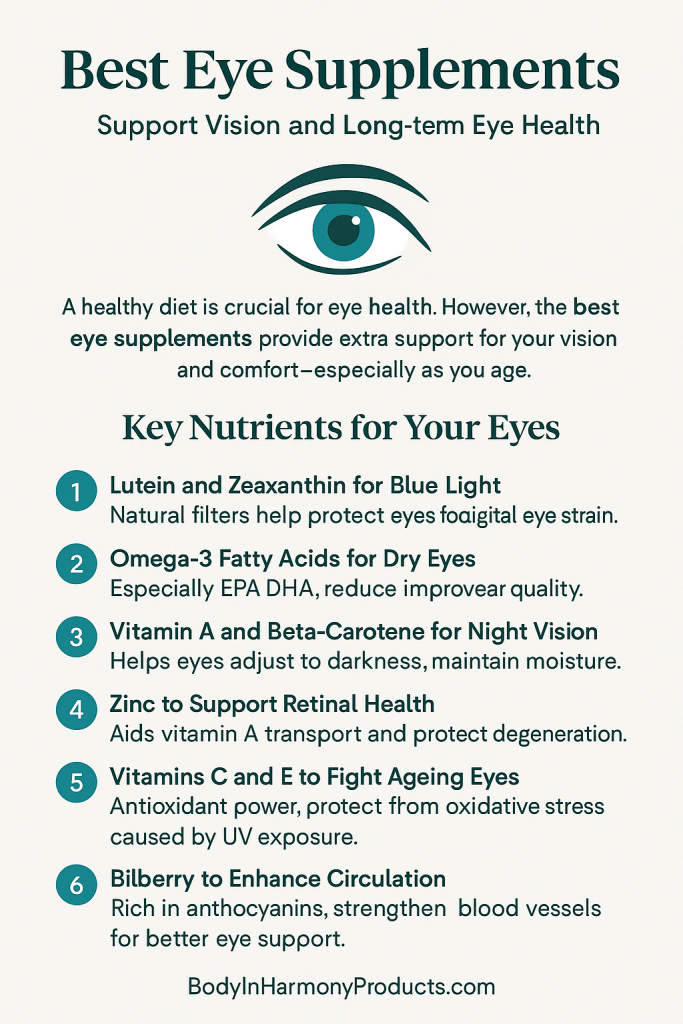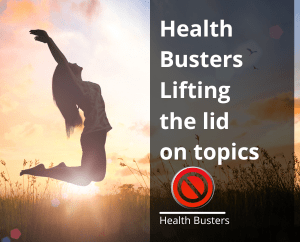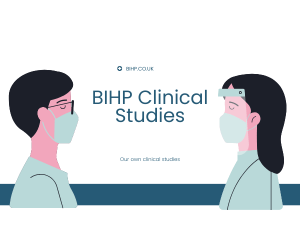Best Eye Supplements to Support Vision and Long-Term Eye Health
Your eyes work hard from the moment you wake up. Whether you’re glued to a screen or dealing with dry air and bright lights, your vision needs support. Although a healthy diet plays a huge role, the best eye supplements can give you that extra boost to keep things clear, comfortable, and strong—especially as you age.
In this article, I’ll walk you through the most effective ingredients, what the science says, and how to pick a supplement that genuinely works.
Why Eye Supplements Deserve a Spot in Your Routine
It’s no secret that your vision changes over time. However, few people realise just how early those changes begin. Between digital eye strain, UV exposure, and nutrient deficiencies, your eyes face a lot of pressure.
That’s why the best eye supplements are designed to fill those nutritional gaps. They support key structures like the retina, macula, and tear film while helping reduce oxidative stress. Even better, they’re easy to add to your daily routine with little effort.
Best Eye Supplements and Their Benefits
Let’s explore the nutrients that truly make a difference when it comes to protecting your vision and eye comfort.
1. Lutein and Zeaxanthin: Natural Blue Light Filters
These carotenoids are found in the macula and act as natural sunglasses. They filter blue light and reduce oxidative damage caused by daily screen use. Furthermore, studies show they support sharp central vision.
Because of their proven results, they’re core ingredients in nearly all of the best eye supplements available.
2. Omega-3 Fatty Acids: Relief for Dry, Irritated Eyes
Omega-3s like EPA and DHA help maintain a healthy tear film, reduce inflammation, and ease dry eye symptoms. Additionally, they play a role in retinal health and support visual development.
If you work in an air-conditioned space or spend long hours on screens, this is one nutrient you’ll want to include.
3. Vitamin A and Beta-Carotene: Essential for Night Vision
Vitamin A helps your eyes adjust to darkness and improves moisture balance on the eye’s surface. While animal-based forms are most direct, plant-based beta-carotene is a solid vegan-friendly option.
Without enough vitamin A, your night vision may start to decline sooner than you think.
4. Zinc: The Mineral That Makes It All Work
Zinc supports the transport of vitamin A to the retina, where it’s used to form visual pigments. It also aids antioxidant activity and may help prevent long-term degeneration.
If you’re taking a multi-nutrient blend, make sure zinc is included in an absorbable form like zinc citrate or gluconate.
5. Vitamins C and E: Antioxidant Protection for Ageing Eyes
These two antioxidant vitamins work best when combined. Vitamin C helps maintain capillary strength and collagen in the eye, while vitamin E protects fatty tissue and eye cells from oxidative stress.
Because both are depleted by environmental exposure, they’re important additions to any long-term supplement plan.
6. Bilberry Extract: Traditional Support for Sharp Vision
Bilberries are rich in anthocyanins that boost blood circulation and reduce inflammation. Historically, pilots used bilberry to support night vision—and modern research suggests they were on to something.
Not surprisingly, bilberry shows up frequently in the best eye supplements thanks to its time-tested benefits.
Choosing the Right Eye Supplement
With shelves full of options, here’s how to narrow it down:
-
Check the label for the nutrients listed above in proper dosages
-
Avoid synthetic fillers like artificial colourants or unnecessary preservatives
-
Opt for clean formulas, preferably third-party tested
-
Consider your diet—vegans may benefit from algae-based omega-3s or plant-based capsules
If you’re unsure, consult your optician or healthcare provider—especially if you already take medication or have diagnosed conditions.
Who Should Consider Eye Supplements?
While everyone can benefit from extra nutrients, certain groups need them more than others. For example:
-
Adults over 40
-
People with a family history of macular degeneration
-
Office workers exposed to screens daily
-
Contact lens wearers or those with chronic dryness
-
Vegans or vegetarians with limited dietary variety
Adding one of the best eye supplements to your daily routine is a smart move if you’re in any of these categories.
What the Research Tells Us
The AREDS and AREDS2 clinical trials, funded by the National Eye Institute, revealed that key nutrients like zinc, lutein, zeaxanthin, vitamin C, and vitamin E can slow the progression of macular degeneration.
Additionally, modern research supports the use of omega-3 fatty acids for dry eye and bilberry extract for blood vessel integrity. These findings confirm what many holistic practitioners have observed for years.
Final Thoughts on the Best Eye Supplements
Whether you’re preventing eye strain or safeguarding your future vision, the best eye supplements offer simple yet powerful support. With the right nutrients in place, you can help reduce inflammation, ease dryness, and maintain clarity—day after day.
So if your eyes are working overtime, give them the nutrients they deserve. After all, clear vision is worth protecting.
We hope you liked the article and you got some value from it. below are a few related posts that you might want to have a read through, to support your eye health naturally, check out:
- If you’re focusing on long-term macular protection, don’t miss our full guide on lutein for eyesight — one of the most researched nutrients for vision health.






